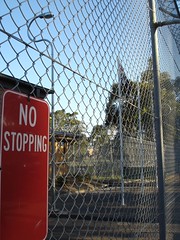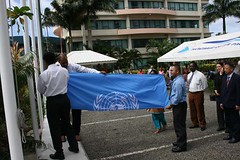Source: Aid Netherlands
 |
| Dalam Botol cast |
By Dr. Jason Abbott
Last week 66 young boys in the conservative largely Muslim state of Terengganu, Malaysia, were
sent to a special ‘re-education’ camp for displaying signs of effeminacy which if left ‘unchecked’, state official argued, could “reach the point of no return”. In other words they could ‘become’ gay or transsexual.
While the women’s minister,
Shahrizat Abdul Jalil, criticized this move, neither the state government nor the Federal government has yet acted to do anything about this. But we should not be either shocked or surprised since
gay rights in Malaysia are largely non-existent.
Only a month earlier for example, Malaysian radio stations chose to deliberately ‘garble’ the line, “No matter gay, straight or bi, lesbian or transgendered life, I’m on the right track, baby” in the Lady Gaga song “Born this Way” for fear of being fined by the government for breaking rules on ‘good taste… decency.. [or for being] “offensive to public feeling”.
Indeed as the current trial of the opposition leader, and former deputy Prime Minister,
Anwar Ibrahim visibly demonstrates, the country’s religious and political elite continue to regard homosexuality as a morally repugnant way of life. Thus in Anwar’s case putting him on trial for sodomy (which is punishable by up to 20 years in prison) has proven a ‘convenient’ and sadly rational tactic by the government to destroy his political career and tarnish his public image.
But Malaysia is by no-means on it’s own in the region in its staunchly conservative stance. When it comes to Lesbian, Gay, Bisexual and Transgender rights, Southeast Asia is found severely wanting.
While Thailand might be infamous for its transsexual ‘lady boys’, same-sex marriage and same-sex adoption remain illegal, and there are no anti-discrimination laws nor laws concerning gender and identity expression.
Arguably the most gay-friendly country in Southeast Asia (perhaps surprisingly given that it is overwhelmingly Catholic) is The Philippines, where same-sex adoption is permitted and since 2009 openly gay men and women have been allowed to serve in the military. However even here anti-discrimination law is largely absent nationally, while same-sex marriages or civil partnerships are not officially recognized.
And yet Thailand, Cambodia and The Philippines are in a veritable league of their own compared to the rest of the region. In Burma, Brunei, and Malaysia homosexuality remains illegal with harsh prison sentences the normal punishment; none of the ten Southeast Asian countries recognize neither same-sex marriages or partnerships; only two allow same-sex adoption (Cambodia and The Philippines); three allow gay men or women to serve in the military (The Philippines, Thailand and Singapore) and none have passed anti-discrimination laws.
To defend this appalling track record, arguments have been made about ‘cultural and spiritual pollution’ from the decadent (sic) West, and about the incompatibility of homosexuality with the teachings of Islam and other religions. In most cases the opposition is pure bigotry and drawn from the view that regards LGBTs as nothing more than deviant ‘life-style’ choices.
The head of Malaysia’s controversial Islamic Affairs department in an interview with Time magazine in 2000 epitomized this view when he remarked that homosexuality “is a crime worse than murder”. When asked if it was wrong for two people of the same sex to love each other he rebuked the questioner replying, “Love? How can men have sex with men? God did not make them this way. This is all Western influence”.
In even starker terms former Prime Minister of Malaysia Dr. Mahathir Mohamad warned in a national day speech in 2003 that “if there are any homosexuals in Malaysia they had better mend their ways.” In the same speech he also criticized the West saying that, “they are very angry — especially their reporters, many of whom are homos — when we take legal action against these practices.”
But it is not simply Malaysia where such views remain widespread. For example, a crowd of extremists
shut down the 4th International Lesbian and Gay Association Asia conference that was supposed to take place in Surabaya, Indonesia between 26th and 28th March 2010. In addition all 150 participants had to evacuate the conference hotel.
However perhaps there are the first signs of change. This year the first gay movie to be made and shown in Malaysia has proven to be a box-office success. Despite being required to make some 30 minutes of editing by the country’s film censorship board, the movie “Dalam Botol” (In a Bottle) tells the story of a young man who has a sex-change operation to please his male lover, although he later regrets the decision.
While there are no love scenes, nudity or kissing, the movie does open with a bare-chested male couple massaging each other on a beach at night.
Ironically perhaps the movie has been slammed not just by conservative Muslim groups but also by gay rights activists because the main character eventually regrets his decision. One activist remarked in
an interview with the British newspaper The Guardian that, “The ending is very negative. Having the main character regret being gay and falling in love with a woman is not going to help our image problem here.”Pang Khee Teik of Sexuality Independence echoes this view arguing that, “Many of us Malaysian gays, lesbians and transgenders have absolutely no regrets being who we are.”
While the plotline was clearly influenced by Malaysia’s film production code, which states that LGBT characters when depicted on screen must realize they are at fault for their sexuality, and reform themselves, the film’s producer Raja Azmi Raja Sulaiman defends the movie arguing that:
”If my film has a message, it’s please don’t change yourself for love. My friend [on whom the movie was based] has suffered so much, and I don’t want other people to suffer like him.”
Nevertheless the fact that the movie was made, made it to the screen, and took over $350,000 in its first five days (recouping its cost), is quite remarkable. As the film’s producer remarked in an interview with Associated Press, “Even five years ago we wouldn’t have been able to make it”.
If from small acorns mighty oaks do indeed grow, then Dalam Botol may just represent the first few vulnerable shoots of attitudinal change on LGBT rights.






















 Join our page
Join our page

